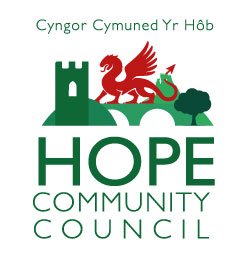About your Council
Council Role
Community and town councils are the grassroots level of local governance in Wales.
There are over 730 community and town councils throughout Wales. Some represent populations of fewer than 200 people, others populations of over 45,000 people; but they all work to improve the quality of life and environment for citizens in their area.
Community and town councils are accountable to local people and have a duty to represent the interests of the different parts of the community equally.
About 8,000 people in Wales give voluntary service as community and town councillors
Rules and Procedures
There are strict rules on the conduct of community councillors to ensure that there are no conflicts of interest. There is a regularly updated register of members interest.
The public are welcome to attend Council meetings. They are held at 6:30pm on the first Wednesday of every month (excluding August) at ne Heulwen Close Community Centre, Hope.
Members
Election of new council members takes place every 5 years, the last election was in May 2017.
You can view the Councillors and their contact details here…
Areas of Responsibility
The Community Council is responsible for:
Consultation
The council is regularly consulted by Welsh Government, the Local Authority and other statutory bodies
Planning
The Council are a statutory consultee for all planning applications in the ward. The council advise the County Council planning officers on the use of Section 106 funds associated with new developments. The public are welcome to attend monthly Community Council meetings where planning applications are discussed.
Environment
Benches and seats
Repair and maintenance of bus shelters
Liaison with Cadw and Natural Resources Wales
Financial Assistance
Financial assistance for groups / organisations*
Playgrounds
The council is responsible for the management and maintenance of play areas at Queensway Play Area, Hope
Christmas lighting
Purchase and installation
Crime and Antisocial Behaviour
The council liaises regularly with our local PCSO and represents the interests of residents affected by crime and anti-social behaviour.
Responsibility for CCTV installation and maintenance
Communication
The council have noticeboards…Facebook and the website.
Pressure
The Council acts as the voice of the community with businesses, organisations and government or local authority departments.
Engagement
The council are actively improving the ward through holding Engagement Drop in Events throughout the year
Benefits of a community council
The independent research study carried out by Aberystwyth University in 2003 concluded that “the benefits of community and town councils outweigh the associated costs and that there is a strong argument for the establishment of community councils in all parts of Wales.” The study identified 8 key benefits of community councils:
Local Responsiveness: Most members of community and town councils live in the communities they serve and many councils also engage with local residents through surveys, newsletters and public meetings. As such community and town councils can be more responsive than higher tier authorities to community needs and interests, and to the diversity of interests and needs within a community.
Representation of Local Interests: Community and town councils can act as a vehicle for the representation of local interests to external bodies. Whereas principal councils have to balance the competing needs and interests of the many communities across their territory, community and town councils have a responsibility for a single community and are able to be uninhibited in advocating the interests of that community.
Mobilisation of Community Activity: Community and town councils exist at a scale that reflects people’s patterns of social interaction and their identification with place. They can therefore act to facilitate community activities, organise and sponsor community events and promote community spirit and inclusiveness. Community and town councils play a vital role in supporting local clubs and organisations. Collectively they donate over £1 million in grants to community groups, sports clubs, charities and other voluntary sector organisations each year – funds that are not available in communities without councils.
Additionality: Community and town councils can provide additionality to the services and facilities operated by county and county borough councils. They have the flexibility to enhance service provision in the community, or to provide additional services, facilities or even simple features such as floral displays, that may lie outside the principal councils’ budgetary priorities.
Accountability: The authority of community and town councils comes from their electoral mandate. Unlike the officers of non-statutory community associations, community and town councillors are accountable to the local electorate and may be removed at election time. Furthermore, they are accountable to the whole community, not to a paid-up membership, and therefore have an incentive to engage with and represent all sectors of the community, not just those most predisposed to join local societies.
Stability and Continuity: The statutory constitution of community and town councils gives them a relative security of existence. Unlike non-statutory community associations, they are not dependent on recruiting members or securing a continuity of funding from grant-making bodies. This means that community and town councils can plan on a longer-term basis and have more capacity to take on larger-scale projects.
Tax-raising Powers: The ability of community and town councils to precept the council tax is one of their most significant powers. Whilst they may be restricted in accessing funds in other contexts, the ability to precept provides a relative stability of income (again supporting long-term planning) and a means of raising funds from the community for reinvestment in the community for communal benefit.
Promotion of Public Service: Participation as a community or town councillor more substantially engages an individual in public service in local government than participation in a non-statutory community association. Community and town councils can provide a ‘training ground’ for individuals who may subsequently progress to serve as county or county borough councillors, or to stand for higher political office.

